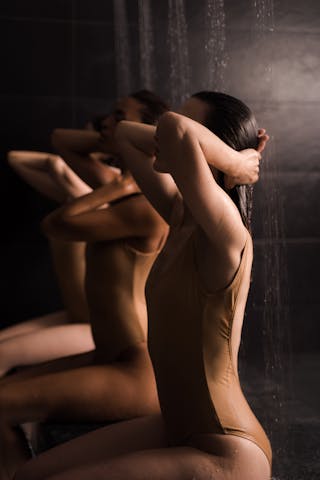The question of whether not wanting to date a bisexual man makes you a bad person is a complex and nuanced one. In today's society, there is a growing recognition and acceptance of the LGBTQ+ community, and the rights and experiences of bisexual individuals are increasingly being acknowledged. However, there are still lingering stigmas and misconceptions surrounding bisexuality, and this can impact people's dating preferences and attitudes.
So, you've got a type, right? We all do. But what if your type excludes an entire group of people? Is that fair? Is it wrong to have preferences? These are the questions we're diving into on Dating Tales. Check out our latest article for some thought-provoking insights: The Great Debate: Preferences vs. Prejudices. You might be surprised by what you discover.
Understanding Bisexuality
If you're ready to discover love again and try mature dating in Dagenham, check out Devilish Desire for a chance to connect with like-minded individuals.
Before delving into the question at hand, it's important to first understand what bisexuality actually means. Bisexuality refers to a sexual orientation where an individual is attracted to people of their own gender as well as people of other genders. It's crucial to recognize that bisexuality is a legitimate and valid sexual orientation, and bisexual individuals should be respected and valued just like anyone else.
Challenges and Misconceptions
Discover the top escort agency in Irving for an unforgettable experience
Unfortunately, bisexuality is often misunderstood and misrepresented in mainstream culture. Bisexual individuals may face discrimination and marginalization from both the heterosexual and LGBTQ+ communities. There is a pervasive stereotype that bisexual people are promiscuous, untrustworthy, or unable to commit to a monogamous relationship. These harmful stereotypes can influence how people perceive and interact with bisexual individuals, including in the dating realm.
Personal Preferences and Boundaries
When it comes to dating, everyone has their own set of preferences, boundaries, and deal-breakers. It's entirely valid for someone to have specific criteria for the type of partner they are seeking, whether it's related to physical appearance, personality traits, or other factors. This includes sexual orientation. It's important to recognize that people are entitled to their own dating preferences, and these preferences do not necessarily make them a bad person.
Examining Bias and Prejudice
However, it's also crucial to examine the underlying reasons behind one's reluctance to date a bisexual man. Are these feelings rooted in biases, stereotypes, or misconceptions about bisexuality? It's important to critically reflect on whether one's hesitance to date a bisexual man is based on genuine personal preferences or if it's influenced by societal prejudices. Challenging our own biases and prejudices is an essential part of personal growth and fostering inclusivity.
Open Communication and Education
If someone is unsure about dating a bisexual man, it's essential to engage in open and honest communication. This includes having respectful and non-judgmental conversations with bisexual individuals to gain a better understanding of their experiences and perspectives. Education and awareness can also play a significant role in challenging misconceptions about bisexuality and fostering empathy and understanding.
Ultimately, the question of whether not wanting to date a bisexual man makes you a bad person is a complex one that doesn't have a definitive answer. It's essential to recognize and respect individual dating preferences while also being mindful of the potential impact of biases and prejudices. Engaging in open communication, self-reflection, and education can help navigate these nuanced discussions and promote greater inclusivity and understanding in the dating world.
- https://free-local-hookup-website.sonya-renee.com/posts/first-one-night-stand-stories-11-women-recall-their-first-casual-sex/
- https://dating-blog.thehottieandthenottie.com/posts/
- https://online-dating-platforms.stylebytes.net/posts/dating-men-called-daniel-heres-why-i-dated-8-men-with-the-same-name/
- https://free-casual-hookup-site.wsmchicago.com/posts/pansexual-meaning-and-definition-what-is-pansexual/
- https://online-local-hookup-apps.datingapps.shop/posts/autistic-dating-when-youre-lgbtq/
- https://top-discreet-dating-app.patternismovement.com/posts/coming-out-as-bisexual-while-in-a-relationship-10-women-explain/
- https://dating-blog.getweps.com/posts/the-13-best-anal-sex-toys-for-beginners-in-2023/
- https://online-discreet-hookup-app.warriorkingsbattles.com/posts/lesbian-sex-first-time-tips/
- https://best-local-encounters-website.datingapps.shop/posts/9-truly-horrifying-sex-confessions/
- https://online-hookup-site.hankwilliamsmothersbest.com/posts/5-positions-that-prove-clothes-make-sex-hotter/
- https://best-local-encounters-platform.prettygirlsmakegraves.com/posts/dating-expert-and-oloni-explores-longdistance-love-for-a-week/
- https://online-dating-websites.jershaanddup.com/posts/my-best-sex-ever-was-a-quickie-with-a-complete-stranger/
- https://discreet-hookup-websites.sonya-renee.com/posts/sex-after-coming-out-as-asexual/
- https://free-discreet-hookup-app.andreachimenti.com/posts/frozen-2-is-elsa-a-lesbian-or-asexual/
